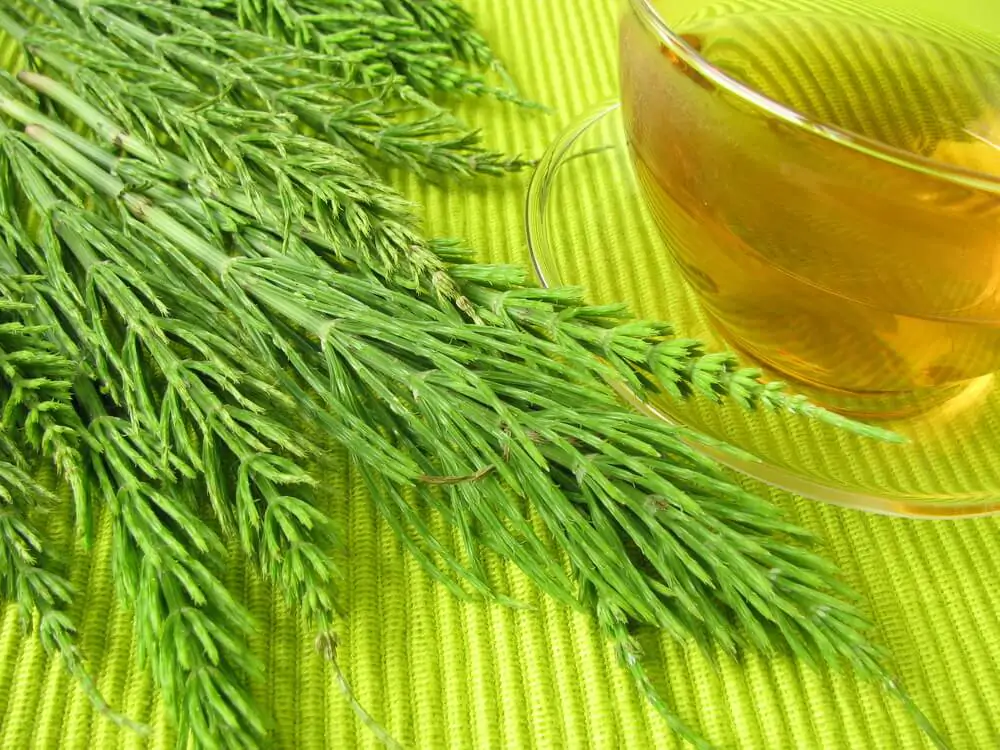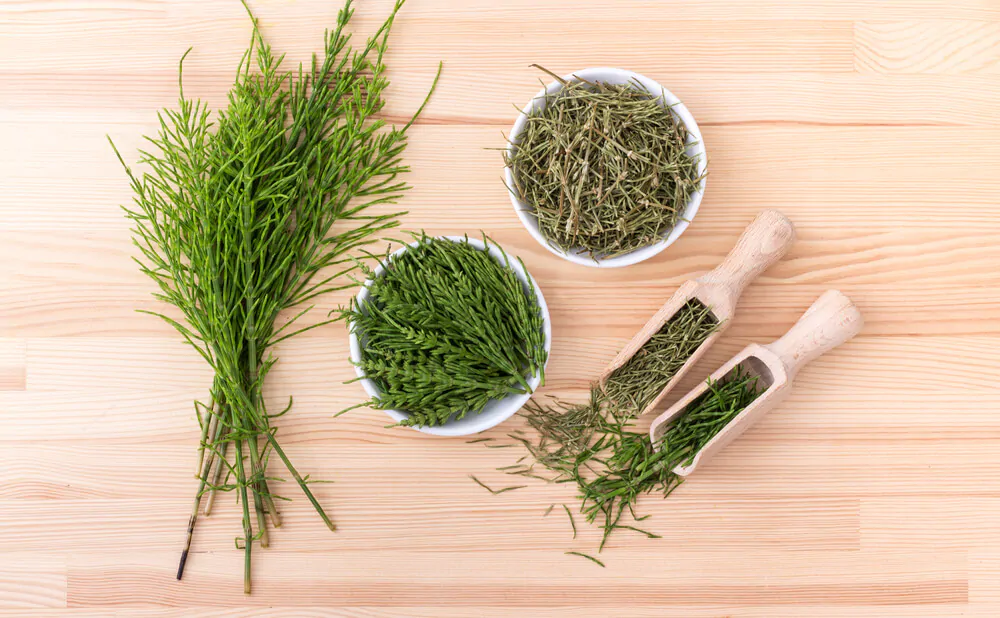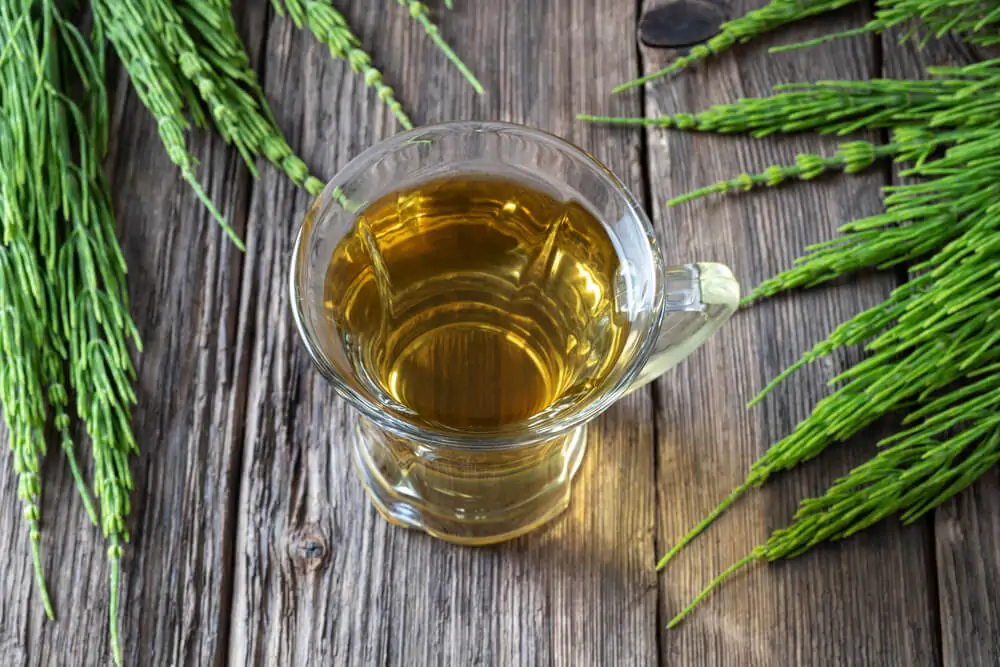What is Horsetail tea? Horsetail is an ancient herb that has been used to treat a variety of health problems. Many people ingest it in the form of tea.

Native Americans, ancient Romans, and ancient Chinese all used horsetail, and it’s still in usage today around the world for a variety of ailments.
While you can consume horsetail (Equesetum arvense) as a tincture or a capsule, people most often take it in tea form. However, you must steep the dried leaves in hot water for a set time to reap the benefits.
Let’s explore horsetail tea, its health benefits, and possible side effects.
What is Horsetail Tea?
Think of the horsetail plant as you would a fern. The scaly leaves and pointed, hollow stems are similar to the fern, and it is only the part that is above ground that is used for medicinal purposes; the root is unusable.
Horsetail tea comes from the leaves of the Equisetum plant, a non-flowering weed that is a close relative of ferns. It’s the descendent of a huge tree-like plant that thrived in the Paleozoic era, 400 million years ago.
Today’s plant grows in parts of Europe, Asia, the Middle East, and North America. It starts out with hollow stems and shoots that look like asparagus, which eventually branch to look like feathery horse tails.
It’s the above-ground part of the horsetail plant that people dry to turn into tea.
Horsetail is high in nutritional content, including:
- Silica and silicic acids (5-8%)
- Saponin equisetonin (5%)
- Flavone glyccosides (including isoquercitrin, galuteolin, and equisetrin)
- Aconitic acid
- Calcium
- PABA
- Fatty acids
- Fluorine
- Vitamin B-5
- Zinc
How to Make Horsetail Tea

If you have the correct ingredients, you can brew the tea at home. Check out this simple way to make your own batch.
Ingredients
- Two to three teaspoons of dried horsetail
- Two cups of hot water
- Honey or any other sweetener of your choice
Instructions
- Start by boiling a pot of water.
- Add two to three teaspoons of the fried horsetail to a teapot and cover it.
- Slowly pour the hot water over the top of the leaves.
- Allow the tea to steep for eight to ten minutes.
- Strain the tea from the leaves in the pot and add your sweetener to taste.
- Enjoy!
What Does Horsetail Tea Taste Like?

Horsetail tea has a mild flavor, similar to how grass would taste if you can imagine that. It goes well when you add extra herbs to the pot. You can also use honey to mask that distinct herbal taste. Overall, it goes down smoothly.
Health Benefits of Horsetail Tea
The health benefits of horsetail have been explored since the times of ancient Greeks and Romans, who used its antimicrobial properties to treat wounds. Since then, people have used horsetail tea as a folk remedy for various purposes, believing that it may have health benefits for:
- Fluid retention
- Urinary tract infections
- Loss of bladder control
- Wounds
- Skin
- Hair
- Brittle nails
- Bones
- Arthritis
- Bleeding ulcers
- Hepatitis
- Jaundice
- Tuberculosis
Unfortunately, there isn’t good scientific evidence to support all of these uses.
Studies do, however, support the claims that horsetail tea is useful for the following:
- Antimicrobial activity: Horsetail essential oil has potent activity against fungi and bacteria such as Aspergillus niger, Candida albicans, Staphylococcus aureus, and Escherichia coli.
- Anti-inflammatory activity: Studies demonstrate that horsetail extract might inhibit lymphocytes; these are the defense cells involved in inflammatory immune diseases.
- Antidiabetic effect: Animal studies demonstrate that horsetail extract may help regenerate damaged pancreatic tissues and help to lower blood sugar levels.
- Antioxidant activity: Studies show that horsetail is abundant in phenolic compounds — these are a group of solid antioxidants that stop oxidative damage to your cellular membranes.
- Bone disorders, osteoporosis, and healing osteocytic tissue: Because of its effects on bone metabolism, some studies indicate that it can help treat bone issues.
Side Effects
There are some potential side effects that you should be aware of, especially when consumed in excess:
- Thiamine or Vitamin B deficiency: Thiamine or Vitamin B deficiency can occur with long-term use. Some horsetail tea includes thiamine to counter this effect. It can also cause people with alcohol use disorder to have a greater thiamine deficiency.
- Allergies: Some people who are allergic to carrots or nicotine may also be allergic to horsetail.
- Pregnancy and breastfeeding: There isn’t enough reliable information to know if it’s safe to drink horsetail tea while pregnant or breastfeeding. Thus, avoiding it when pregnant or breastfeeding is a good precaution.
- Low potassium levels (hypokalemia): It’s possible that horsetail may lower blood potassium levels.
This tea should only be consumed regularly for a week, and then take a break. Continually drinking this tea may cause adverse side effects.
If you loved this article then check out What Is Pine Needle Tea?
